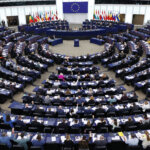Europe becomes data-interoperable – but do its open standards fall short of the mark?

- EU’s Interoperable Europe Act comes into force.
- Open standards, reusability and data exchange.
- Latest in range of laws to limit big tech monopolies.
The adoption on February 6th, 2024, of the EU’s Interoperable Europe Act will help ensure that public bodies in the Community use software and systems that can exchange information and technology freely between them. It aims to promote the reuse of data between public bodies, reducing separate silos of what can be effectively the same information, and to actively deploy and use systems that will make sure that happens easily.
A vital part of the framework rests on open systems and software that will not hinder public organizations from accessing information from others that’s held behind behind inaccessible barriers, such as paid-for API access, or proprietary (closed) data formats and databases. The de facto choice, therefore, for public bodies’ IT decision-makers should be a combination of free (as in libre) software and open standards.
The text of the Interoperable Europe Act contains a clear definition of free software licenses – “solutions that do not carry restrictive licensing terms, such as open source solutions.” The Act also states that public administrations should prioritize open-source software “when [it is] equivalent in functionalities, total cost, user-centricity, cybersecurity or other relevant objective criteria.” That, unfortunately, gives publicly-funded EU bodies an opt-out clause from using free and open-source software. According to the FSFE (Free Software Foundation Europe), the ambiguous wording in the Act means “the Commission is going in the opposite direction of the ‘Free Software first’ approach that this legislation needs,” and furthermore, “It […] shows a lack of ambition which could have led [the Interoperable Europe Act] to become a real game-changer.”
Lobbying by the FSFE throughout the progress of the IEA succeeded in mandating the Commission to provide an annual report on interoperability solutions for public services. The Act contains what it calls ‘Innovation and Support Measures,’ which include regulatory sandboxes (trial of new services and methods without some of the usual rules applying) to promote policy experimentation and the eventual scaling-up of interoperability solutions for reuse across the EU.
Open standards and interoperability
Mandatory assessments for interoperability will also become a feature of IT decision-makers’ administrative burden, alongside the existing raft of reporting around data sovereignty, cybersecurity and data usage. To aid choices in technology solutions that use open standards, the Act describes an Interoperable Europe Portal where shared and reusable solutions can be listed and described.
Although, in general, the Interoperable Europe Act is a positive step to engender a more open approach to data exchange and the choice of systems deployed by public bodies, the progress of its implementation will have to be closely monitored. Open standards in technology drive platform agnosticism and vendors of large technology solutions will want to discourage migration away from closed systems to equivalent open-source software and open standards.
The private sector, in the form of big tech companies, has a significant interest in the EU’s public sector procurement processes: the most often-told tale that epitomizes this fact involves Microsoft’s move of its headquarters to near Munich, right around the time when there was significant impetus by city hall to shift its workforce from Microsoft’s platform and services to open-standard formats and vendor-neutral software.
That means that the acid test of the effectiveness of the Interoperable Europe Act will come as public sector technology contracts come due for renewal across Europe.

“European Union Expansion Celebration” by rockcohen is licensed under CC BY-SA 2.0.
The EU is often seen as an area of the world in which large technology companies have a more limited scope to practice compared to, for example, the US. The Digital Services Act and the Digital Markets Act, for example, impose new obligations and potential fines on companies for non-compliance that can amount to 10% of a business’s annual revenue. Under the Digital Markets Act, the European Commission has the authority to break up businesses that are repeat offenders against its legislation. These laws and ensuing powers granted to the intragovernmental body are designed to encourage competition and remove monopolistic practices from the European continent.
With IT playing an increasing and inescapable part of civil life, the EU’s attempts to protect its citizens are inextricably linked with technology, its implementation and use. In the same way as it legislates around drinking water quality, air pollution, and safety in the workplace, its concerns are not anti-business, but pro-people. Its ethos may be not appreciated everywhere in the world, but since the end of World War II, European countries have acted on the realization that peace and prosperity come through unity and collectivism, not unfettered free markets.
Lina Ceballos, FSFE policy project manager, stated, “We will monitor the implementation to make sure that free software reaches its full potential as an enabler of transparent, reusable and shareable solutions. We will also keep a close watch for opportunities where the free software community can engage and by providing its expertise support public administrations throughout the EU in delivering free software interoperable digital services.”










